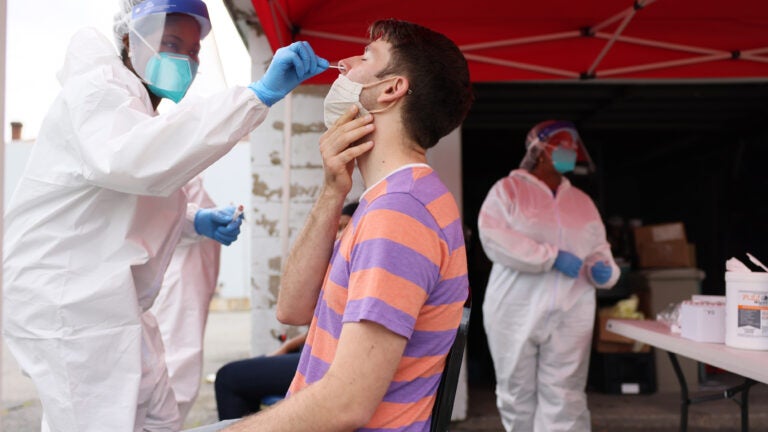 A nurse administers a COVID look at various provided by way of Harvard street neighborhood fitness center at Prince corridor Grand inn in Boston. Jessica Rinaldi / The Boston Globe
A nurse administers a COVID look at various provided by way of Harvard street neighborhood fitness center at Prince corridor Grand inn in Boston. Jessica Rinaldi / The Boston Globe Getting the COVID-19 vaccine may not handiest present insurance plan in opposition t severe problems from the sickness. it could possibly also decrease the chances that people who get the virus spread it to others — and we're getting a much better concept why.
in response to a new examine led by means of Harvard T.H. Chan college of Public health and published Wednesday within the New England Journal of medication, vaccinated people who contract COVID-19 could be much less more likely to spread the virus as a result of they "shed" it for a shorter duration of time than unvaccinated people who are infected.
Researchers discovered that leap forward infections in vaccinated people cleared in a regular of 5.5 days, roughly two days quicker than infections in unvaccinated people, who remained contagious for an average of seven.5 days.
whereas it's feasible that people with leap forward cases are nevertheless as infectious as unvaccinated individuals throughout the early levels of their infection, the analyze authors wrote that their shorter infectiousness length skill they're less more likely to spread the virus over time.
The findings backs up the consensus amongst fitness specialists that vaccinated individuals are less prone to unfold COVID-19, though the accurate cause had been a bit of muddled.
Following the emergence of the greater contagious delta variant this summer time, some fitness officials, together with the facilities for sickness handle and Prevention, suggested that the cause absolutely vaccinated individuals may transmit the new strain less demanding than previous versions became because it resulted in an improved top viral load — or higher degree of virus particles — within the contaminated individual.
besides the fact that children, the brand new Harvard examine means that concept isn't correct.
within the examine, researchers pointed out they discovered no meaningful change in peak viral masses from the distinct COVID-19 variations, suggesting the delta strain's accelerated transmissibility turned into no longer definitely as a result of better virus creation.
"Our work provides probably the most distinct suggestions up to now about how viral concentrations change within the physique across the complete period of SARS-CoV-2 infection," Stephen Kissler, postdoctoral immunology fellow at Harvard and co-creator of the look at, pointed out in a statement.
The examine turned into performed in partnership with the NBA's occupational fitness software, accumulating very nearly 20,000 coronavirus samples between Nov. 28, 2020 and Aug. eleven, 2021 from 173 avid gamers and league personnel. The samples protected a few diverse versions, including the original alpha and more fresh delta lines, detected in both vaccinated and unvaccinated individuals.
nonetheless, the look at's authors advised that additional analysis is integral, since the analyze predominantly worried young, male, and suit individuals, and is for this reason now not consultant of the well-known population.
presently, the CDC recommends that folks that examine high quality for COVID-19 self-isolate for 10 days, regardless of no matter if they are vaccinated or not.
The findings come amid an increase in leap forward infections, as officials urge all adults to get an additional booster shot to enhance their immunity.
Over the last few weeks, breakthrough cases have accounted for over a third of all new COVID-19 infections in Massachusetts. Unvaccinated people still account for a disproportionate variety of instances within the state, in which over 70 % of the inhabitants is thoroughly vaccinated. As of ultimate week, just 0.05 % of entirely vaccinated residents had been hospitalized because of COVID-19.
publication Signuplive up up to now on the entire newest information from Boston.com

0 Comments